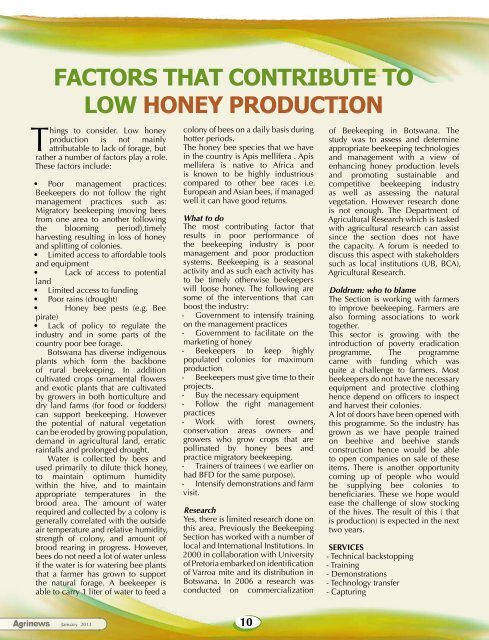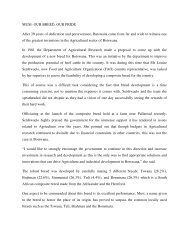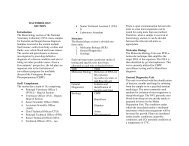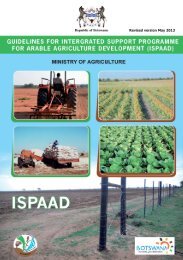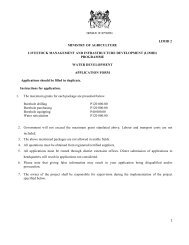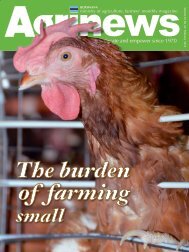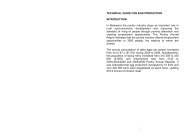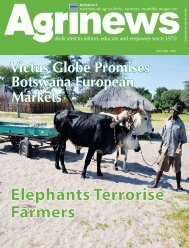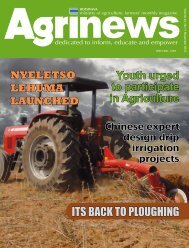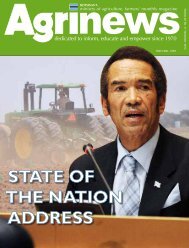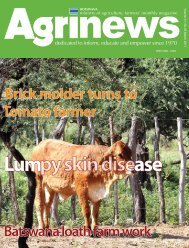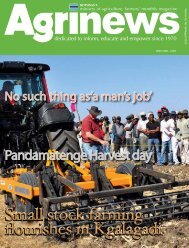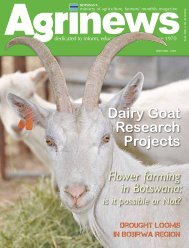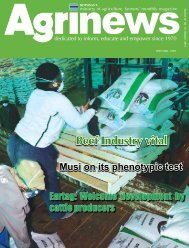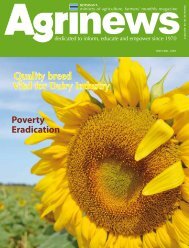Agrinews January 2013 - Ministry of Agriculture
Agrinews January 2013 - Ministry of Agriculture
Agrinews January 2013 - Ministry of Agriculture
Create successful ePaper yourself
Turn your PDF publications into a flip-book with our unique Google optimized e-Paper software.
FACTORS THAT CONTRIBUTE TO<br />
LOW HONEY PRODUCTION<br />
&<br />
:3975122/3912571,FAX: 3951643<br />
Things to consider. Low honey<br />
production is not mainly<br />
attributable to lack <strong>of</strong> forage, but<br />
rather a number <strong>of</strong> factors play a role.<br />
These factors include:<br />
• Poor management practices:<br />
Beekeepers do not follow the right<br />
management practices such as:<br />
Migratory beekeeping (moving bees<br />
from one area to another following<br />
the blooming period),timely<br />
harvesting resulting in loss <strong>of</strong> honey<br />
and splitting <strong>of</strong> colonies.<br />
• Limited access to affordable tools<br />
and equipment<br />
• Lack <strong>of</strong> access to potential<br />
land<br />
• Limited access to funding<br />
• Poor rains (drought)<br />
• Honey bee pests (e.g. Bee<br />
pirate)<br />
• Lack <strong>of</strong> policy to regulate the<br />
industry and in some parts <strong>of</strong> the<br />
country poor bee forage.<br />
Botswana has diverse indigenous<br />
plants which form the backbone<br />
<strong>of</strong> rural beekeeping. In addition<br />
cultivated crops ornamental flowers<br />
and exotic plants that are cultivated<br />
by growers in both horticulture and<br />
dry land farms (for food or fodders)<br />
can support beekeeping. However<br />
the potential <strong>of</strong> natural vegetation<br />
can be eroded by growing population,<br />
demand in agricultural land, erratic<br />
rainfalls and prolonged drought.<br />
Water is collected by bees and<br />
used primarily to dilute thick honey,<br />
to maintain optimum humidity<br />
within the hive, and to maintain<br />
appropriate temperatures in the<br />
brood area. The amount <strong>of</strong> water<br />
required and collected by a colony is<br />
generally correlated with the outside<br />
air temperature and relative humidity,<br />
strength <strong>of</strong> colony, and amount <strong>of</strong><br />
brood rearing in progress. However,<br />
bees do not need a lot <strong>of</strong> water unless<br />
if the water is for watering bee plants<br />
that a farmer has grown to support<br />
the natural forage. A beekeeper is<br />
able to carry 1 liter <strong>of</strong> water to feed a<br />
colony <strong>of</strong> bees on a daily basis during<br />
hotter periods.<br />
The honey bee species that we have<br />
in the country is Apis mellifera . Apis<br />
mellifera is native to Africa and<br />
is known to be highly industrious<br />
compared to other bee races i.e.<br />
European and Asian bees, if managed<br />
well it can have good returns.<br />
What to do<br />
The most contributing factor that<br />
results in poor performance <strong>of</strong><br />
the beekeeping industry is poor<br />
management and poor production<br />
systems. Beekeeping is a seasonal<br />
activity and as such each activity has<br />
to be timely otherwise beekeepers<br />
will loose honey. The following are<br />
some <strong>of</strong> the interventions that can<br />
boost the industry:<br />
- Government to intensify training<br />
on the management practices<br />
- Government to facilitate on the<br />
marketing <strong>of</strong> honey<br />
- Beekeepers to keep highly<br />
populated colonies for maximum<br />
production<br />
- Beekeepers must give time to their<br />
projects.<br />
- Buy the necessary equipment<br />
- Follow the right management<br />
practices<br />
- Work with forest owners,<br />
conservation areas owners and<br />
growers who grow crops that are<br />
pollinated by honey bees and<br />
practice migratory beekeeping.<br />
- Trainers <strong>of</strong> trainees ( we earlier on<br />
had BFD for the same purpose).<br />
- Intensify demonstrations and farm<br />
visit.<br />
Research<br />
Yes, there is limited research done on<br />
this area. Previously the Beekeeping<br />
Section has worked with a number <strong>of</strong><br />
local and International Institutions. In<br />
2000 in collaboration with University<br />
<strong>of</strong> Pretoria embarked on identification<br />
<strong>of</strong> Varroa mite and its distribution in<br />
Botswana. In 2006 a research was<br />
conducted on commercialization<br />
<strong>of</strong> Beekeeping in Botswana. The<br />
study was to assess and determine<br />
appropriate beekeeping technologies<br />
and management with a view <strong>of</strong><br />
enhancing honey production levels<br />
and promoting sustainable and<br />
competitive beekeeping industry<br />
as well as assessing the natural<br />
vegetation. However research done<br />
is not enough. The Department <strong>of</strong><br />
Agricultural Research which is tasked<br />
with agricultural research can assist<br />
since the section does not have<br />
the capacity. A forum is needed to<br />
discuss this aspect with stakeholders<br />
such as local institutions (UB, BCA),<br />
Agricultural Research.<br />
Doldrum: who to blame<br />
The Section is working with farmers<br />
to improve beekeeping. Farmers are<br />
also forming associations to work<br />
together.<br />
This sector is growing with the<br />
introduction <strong>of</strong> poverty eradication<br />
programme. The programme<br />
came with funding which was<br />
quite a challenge to farmers. Most<br />
beekeepers do not have the necessary<br />
equipment and protective clothing<br />
hence depend on <strong>of</strong>ficers to inspect<br />
and harvest their colonies.<br />
A lot <strong>of</strong> doors have been opened with<br />
this programme. So the industry has<br />
grown as we have people trained<br />
on beehive and beehive stands<br />
construction hence would be able<br />
to open companies on sale <strong>of</strong> these<br />
items. There is another opportunity<br />
coming up <strong>of</strong> people who would<br />
be supplying bee colonies to<br />
beneficiaries. These we hope would<br />
ease the challenge <strong>of</strong> slow stocking<br />
<strong>of</strong> the hives. The result <strong>of</strong> this ( that<br />
is production) is expected in the next<br />
two years.<br />
SERVICES<br />
- Technical backstopping<br />
- Training<br />
- Demonstrations<br />
- Technology transfer<br />
- Capturing<br />
10<br />
<strong>January</strong> <strong>2013</strong> <strong>January</strong> <strong>2013</strong><br />
<strong>January</strong> <strong>2013</strong>


